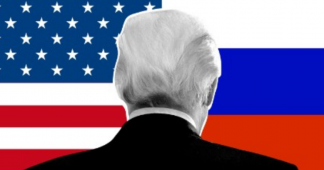November 3, 2020
Pundits and polls are at one in predicting a victory for Joe Biden over Donald Trump in the presidential election, portraying the vote as a non-military rerun of the Battle of Gettysburg in 1863, when the north defeated the south in what is regarded as a turning point in the civil war. The violence will be less this time round, but the hatred between the antagonists is at a similar level.
A comparison with the civil war is appropriate because the confrontation between Trump and Biden echoes the armed conflict a century and a half earlier. White America had broken up into two nations then and, to a significant degree, it is two nations now. Trump’s core support is in the south and rural areas; Biden’s is in the north and metropolitan cities.
The match between the two periods is not perfect and the geographical boundaries that define the two different American national identities have changed. Yet, at the core of Trumpism is the white male evangelical Protestant brand of American nationalism that originates in the south and, since the Civil Rights Act of 1965, has blended with and largely taken over the Republican Party. It has transmuted into a radical American nationalist party, its ideology a toxic combination of racism, chauvinism, messianism, social conservatism and free market economics. It enhanced its political punching power by becoming the vehicle for the grievances of the white working and middle class, whose social and economic security has crumbled under the impact of globalisation and new technology.
It was a strange alliance of billionaires and the left-behind that propelled Trump into the White House in 2016, and it would be good to believe that it will face its Gettysburg moment on Tuesday. Battered by almost four years of Trump’s megalomaniac rule, a majority of Americans from Black Lives Matter supporters to long-standing members of the establishment cannot wait for this to happen. Conservative columnist George Will wrote confidently this week that we were seeing the moment when “the Donald Trump parenthesis in American history closes”, while the Republican Party that enabled his rise was facing a political massacre.
Great if this is true, but Trump has often succeeded against the odds, as he did against Hillary Clinton, because his opponents underestimate him. Crude and mendacious he may be, but he is an extraordinarily effective campaigner, much aided by the ineptitude of the Democratic Party leaders.
Fortunately, the breaks that went in his favour in 2016 are now going against him: the coronavirus itself, the consequent economic collapse, his own infection, and the virus sweeping through states that he needs to win in the last days of the campaign. Panicky headlines on the front pages of newspapers in Wisconsin are all about the surging epidemic there, making Trump’s efforts to play down the illness sound crazed and self-destructive.
A pundit like George Will, along with most of the media, wants to see Trump as a “parenthesis”, an appalling aberration in American history, but here they are on shaky ground. The election of Trump may have been one of history’s wild cards, but he is only facing defeat because of an even wilder card in the shape of the onset of an unprecedented pandemic. Late last year, he had a good chance of winning a second term on the back of a booming economy, given that few sitting presidents had been displaced when the economic winds blew in their favour.
Published at https://www.counterpunch.org/2020/11/03/americas-gettysburg-moment-even-if-defeated-trumpism-will-not-vanish/











